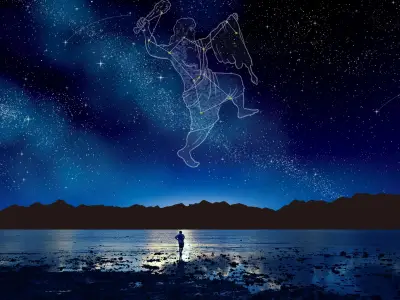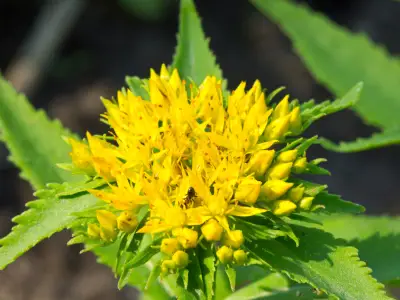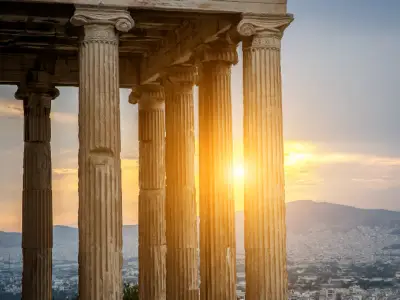If you're curious about Celtic mythology, you've likely come across the name Lugh—a figure surrounded by fascinating stories, symbols, and mysteries. Known for his many talents, powerful artefacts, and deep symbolism, Lugh is a figure who continues to inspire interest today.
So, who was Lugh, and why does he hold such a prominent place in Celtic lore? Let’s explore his myths, powers, and symbols.
Jump to:
- Who Was Lugh in Celtic Mythology?
- Lugh’s Myths
- The Role of Lugh in Celtic Storytelling
- What Powers Did Lugh Possess?
- Symbols Associated with Lugh
- Lugh’s Lineage and Connections
- Why Is Lugh Special?
- Lugh in Modern Culture
- Lugh’s Worship and Legacy
- Frequently Asked Questions About Lugh
- Study Celtic Mythology for £29
Recommended for you!
Best SellersWho Was Lugh in Celtic Mythology?
Lugh, the Celtic god of many skills, is one of the most important deities in Irish mythology. His name is pronounced “Loo”, and he’s sometimes referred to as Lugh Lámhfhada, meaning "Lugh of the Long Arm." He was known as a warrior, king, master craftsman, and a god of many talents.
Lugh belongs to the Tuatha Dé Danann, a supernatural race in Irish mythology. He’s often portrayed as a youthful, radiant figure associated with light, skill, and excellence in every art and craft. Lugh is an Irish name that carries connotations of brightness and light.
Lugh’s Myths

The tales of Lugh reveal why he was celebrated as a god of exceptional skill, intelligence, and bravery. Each story highlights a different aspect of his character, from his cleverness to his prowess in battle.
Lugh and the Court of King Nuada
One of the most famous stories tells how Lugh gained entry to the court of King Nuada, ruler of the Tuatha Dé Danann. The guards would only admit someone with a unique skill, so Lugh confidently listed all his talents—warrior, poet, harpist, craftsman, healer, and more.
When informed that specialists in each trade already served the king, Lugh asked, “But do you have someone who possesses them all?” The answer was no, and with that clever response, Lugh was granted entry, proving that versatility was just as valuable as mastery in a single field.
The Story of Lugh’s Spear
Another captivating tale centres around Lugh’s Spear, a legendary weapon said to guarantee victory in any battle. This magical spear was so fierce that it needed to be kept in a cauldron of water to control its fiery energy, symbolising unstoppable force and divine power.
The spear became a defining symbol of Lugh’s might, often associated with his role as a protector and warrior of the gods.
The Battle of Mag Tuired and the Defeat of Balor
In one of the greatest myths, Lugh leads the Tuatha Dé Danann in the epic Battle of Mag Tuired against the fearsome Fomorians, a race of destructive giants. During this battle, Lugh avenged his grandfather’s death by slaying Balor, a monstrous giant whose deadly eye could kill anyone it gazed upon.
Using his sharp mind and unmatched skill, Lugh struck Balor down, turning the tide of the battle and securing freedom for his people from Fomorian oppression.
The Role of Lugh in Celtic Storytelling
Lugh is often seen as a symbol of versatility and brilliance in Celtic mythology. His role in storytelling highlights the value the Celts placed on being multi-skilled and resourceful. He wasn’t just a warrior or a god of light—he embodied mastery across all disciplines.
The festival of Lughnasadh, held in his honour, marks the beginning of the harvest season. This celebration reminds us of Lugh’s connection to agriculture, community, and the cycles of life.
What Powers Did Lugh Possess?

Lugh was considered a god of all arts and skills, which made his powers incredibly diverse. He wasn’t limited to a single domain like many other gods in different mythologies. Here are some of Lugh’s key powers and attributes:
- Mastery of All Skills: From warfare to music, healing to craftsmanship, Lugh excelled in every field.
- Leadership and Strategy: As a warrior-king, he was a brilliant tactician.
- Magic and Divine Weapons: Lugh wielded powerful artefacts, including his famed spear, which never missed its mark.
- Light and the Sun: Often linked to brightness and solar imagery, Lugh symbolised illumination, both literal and intellectual.
Symbols Associated with Lugh
If you’re wondering about Lugh’s symbols, several key items and images are linked to him:
- The Spear of Lugh: Known as one of the four treasures of the Tuatha Dé Danann, this spear was unbeatable in battle. Though lost to history, it remains a powerful symbol of strength and precision.
- The Lugh Knot: This Celtic knot represents interconnectedness, eternity, and Lugh’s mastery over multiple domains. It symbolises the unity of skills and the endless cycle of life.
- The Lugh Shield: Although less mentioned, the Lugh Shield symbolises protection, resilience, and readiness for battle.
- Solar Symbols: Lugh’s association with light and the sun often links him to radiant, circular motifs.
Lugh’s Lineage and Connections
Lugh’s place in Celtic mythology is shaped by his remarkable heritage and his ties to both divine and mortal realms. Unlike many gods who belong solely to one lineage, Lugh’s ancestry connects him to two powerful yet opposing forces—the Tuatha Dé Danann and the fearsome Fomorians. This dual heritage sets him apart as a bridge between light and dark, civilisation and chaos.
Lugh’s father, Cian, was a noble member of the Tuatha Dé Danann, the supernatural race associated with wisdom, magic, and artistry. His mother, Ethniu, was the daughter of Balor, the monstrous leader of the Fomorians—a race often depicted as giants representing destruction and wild, untamed forces. This unlikely union gave rise to Lugh, a figure destined to unite strength with skill, and order with creativity.
While Lugh is celebrated as a shining hero of the Tuatha Dé Danann, his Fomorian blood adds depth to his character, suggesting a balance between opposing worlds. His defeat of his grandfather Balor in the Battle of Mag Tuired can be seen as both a victory of good over evil and as Lugh overcoming the darker aspects of his own lineage.
Lugh’s connections extend beyond his immediate family. He was fostered by Tailtiu, a goddess associated with the land and agriculture, further strengthening his bond with the earth and its cycles. This fosterage led to the creation of Lughnasadh, the festival in her honour, reflecting Lugh’s respect for kinship and community ties.
Why Is Lugh Special?
Lugh stands out among Celtic gods because he embodies the concept of limitless potential. Unlike deities who govern a single aspect of life, Lugh is celebrated for mastering every skill and craft, making him a symbol of human excellence and versatility. He wasn’t just a warrior or a craftsman—he was both, and so much more.
Lugh’s specialness lies in his ability to inspire people to embrace all their talents, encouraging growth across disciplines rather than confinement to one path. His stories remind you that true strength comes from balancing intellect, creativity, and courage.
Lugh in Modern Culture

Lugh continues to inspire modern literature, gaming, and art, often depicted as a symbol of versatility, intellect, and heroism. Characters influenced by Lugh appear in role-playing games like Dungeons & Dragons, where multi-skilled heroes reflect his archetype, and in novels such as Juliet Marillier’s Sevenwaters series, which draws heavily on Celtic mythological themes. The festival of Lughnasadh is still celebrated by modern pagans, marking Lugh’s enduring connection to creativity, harvest, and community.
Lugh’s Worship and Legacy
In ancient times, Lugh was deeply revered by the Celts of Ireland and beyond, celebrated as a protector, leader, and patron of all arts and trades. His worship was closely tied to Lughnasadh, a festival marking the start of the harvest season, where games, feasts, and ceremonies were held in his honour. These gatherings reinforced community bonds and celebrated human achievement, much like Lugh himself embodied.
While traditional worship faded with the arrival of Christianity, Lugh’s legacy survived through folklore, place names, and cultural memory. Towns like Lyon in France (originally Lugdunum) and various sites across Ireland echo his name, keeping his presence alive in the landscape.
Today, Lugh is honoured by modern pagans, druids, and those with an interest in Celtic spirituality. Many continue to celebrate Lughnasadh, offering thanks for personal growth, creativity, and the fruits of their labour. His story encourages reflection on how you can nurture your own talents and contribute meaningfully to your community.
Recommended for you!
Best SellersFrequently Asked Questions About Lugh
Why does Lugh have three faces?
Depictions of Lugh with three faces symbolise his ability to perceive all things—past, present, and future—highlighting his far-reaching wisdom. This imagery reflects his role as a god who sees beyond the ordinary, embodying insight, awareness, and a deep understanding of life’s complexities.
What are the characteristics of Lugh?
Lugh is characterised by brilliance, creativity, leadership, and adaptability, making him the embodiment of a true polymath. He represents the ideal of excelling in many fields, combining artistic talent, strategic thinking, and warrior strength into one harmonious figure.
What does the name Lugh mean?
Lugh is often associated with words meaning "light" or "brightness," reflecting his radiant nature and connection to illumination, both physical and intellectual. This connection to light symbolises not only his role as a solar figure but also his embodiment of enlightenment, wisdom, and inspiration across all crafts and skills.
What animal is associated with Lugh?
Lugh is sometimes linked to ravens, a symbol of intelligence, foresight, and protection in battle. They appear in related lore due to their sharp vision and roles as messengers or guides, reinforcing Lugh’s connection to wisdom and strategic prowess.
Is Lugh a good god?
Lugh is viewed as a positive, protective figure—one who uses his talents for the benefit of his people, though like many deities, he could also be fierce when necessary.
Study Celtic Mythology for £29
If learning about figures like Lugh has sparked your curiosity, why not learn more about ancient Celtic legends? With Centre of Excellence’s Celtic Mythology Diploma Course, you can explore the fascinating myths, gods, and symbols that shaped ancient Celtic culture.
Whether you're passionate about history, spirituality, or storytelling, this course is engaging for everyone—no prior experience needed. Plus, by following the link below, you can enrol today for the discounted price of just £29.













